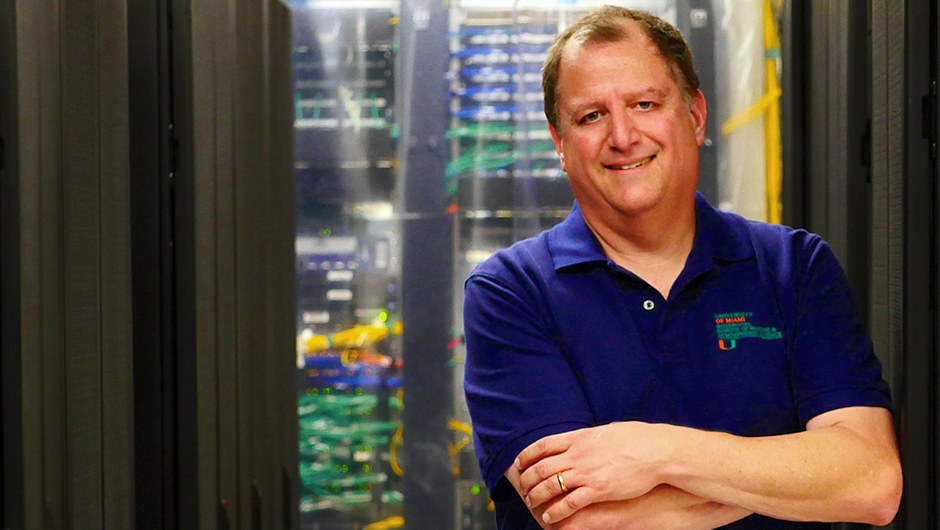
The Institute for Data Science and Computing (IDSC) has appointed Dr. Benjamin Kirtman as it’s deputy director. Dr. Kirtman is a world-renowned research scientist and professor, specializing in climate and atmosphere studies. He came to UM’s Rosenstiel School for Marine and Atmospheric Science in 2007 after leaving his position as a professor at George Mason University, and has since served as the Program Director for Climate and Environmental Hazards at the Center for Computational Science.
Over the course of his career, Kirtman published over 130 academic papers on climate variability, and helped oversee the creation of the North American Multi-Model Ensemble climate prediction system. Now, he will help lead UM into the future during the formation and integration of IDSC.
“I would like to see that every major in every school, in every department, has some little chunk of their curriculum that talks about data,” said Kirtman, who graduated from the University of California-San Diego with a B.S. in Applied Mathematics.
“In communications, in sociology, every department has some component that talks about how data is being used, its relevance to their departments, so, I want to see the notion of data science spread throughout the whole University.”
The Institute for Data Science and Computing will give UM a crucial asset in the 21st century, as accredited universities around the country begin integrating data science and technology into both their curriculum and infrastructure. “Every university in the country, is starting up some data science effort.” Kirtman said. Although UM is far from the first university to begin working with big data, Kirtman has big plans for how the University will continue to innovate at the forefront of a bona fide technological movement.
In his role as IDSC deputy director, Kirtman’s first job is to find innovative thinkers and interdisciplinarians with knowledge of the nuances of using all kinds of data science techniques to advance disciplinary research. “There are some universities that are going to really be setting the bar in terms of developing new data science technology. They have huge resources and they’re going to be developing the next data science algorithms. We’re not going to try to compete with them, but we are going to use their technology to advance disciplinary science.” Kirtman explained.
“We’re looking for that special kind of hire, that person that’s using the state-of-the-art data science technology, and not using it blindly, but using it as a way to convey insight into how things really work.”
Kirtman says dealing with disparate data is one of the challenges in evaluating environmental issues. However, with the right hires, he believes that UM and IDSC will be able to push big data research into uncharted territory.
“If we’re worried about sea level rise for example, and we’re going to worry about what parts of the built infrastructure we’re going to continue to invest in, and what parts we’ll let return to its natural environment.” Kirtman said. “So, you need to be local and interact locally to have the dialog to generate the solutions to those programs. That’s what’s great about living in Miami—you get to be in the forefront of some really important decisions.”
Dr. Kirtman’s work with IDSC will be yet another chapter of a storied career. His climate research and activism has given the Federal Government new tools to contend with the ramifications of surging temperatures, and his work is far from limited to his position at UM. He has held a leadership role in the World Climate Research Program’s (WCRP) seasonal-to-interannual prediction activities. He has chaired the international CLIVAR Working Group on Seasonal to Interannual Prediction (WGSIP), and the WCRP Task Force for Seasonal Prediction (TFSP). In addition, Dr. Kirtman was a coordinating lead author for the Intergovernmental Panel on Climate Change (IPCC) working group one—the Scientific Basis.
Nicholas Tsinoremas, IDSC Institute Director and UM Vice Provost for Research Computing & Data , hired Dr. Kirtman to help bring in new faculty and lead the charge toward interdisciplinary data research.
“I’m thrilled to have Ben on board with IDSC. He was, from the beginning, a vital member of CCS and now he’s getting a much more involved role.” Tsinoremas said. “He’s an extremely well-known scientist, and he’s also got great insights and ideas that can help us get to the next level and be a catalytic force both inside and outside the University.”
The CCS Climate and Environmental Hazards program, which Dr. Kirtman has run since 2007, has been renamed Earth System Science under IDSC. Earth systems uses machine learning and empirical data to track patterns, such as how wind blows, or temperature changes. For now, Dr. Kirtman will continue in his role as the director of that program. However, as IDSC’s role at UM expands in the coming years, he hopes to pass on the torch.
“I want to work with faculty to let them put their own imprint on the image of what that’s going to look like. I got to do a lot with Climate and Environmental Hazards because I was in charge of it, I got to put my fingerprints all over it. I got to decide how it evolved.” Kirtman said. “I think one of the things that I want to see happening next is for these new hires to really start to put their fingerprints on things, to shape what it’s going to look like so that there’s a real long-term future of IDSC.”
In the meantime, Kirtman will help guide UM toward practical technological innovation, one step at a time.
Written by: Parker Gimbel









